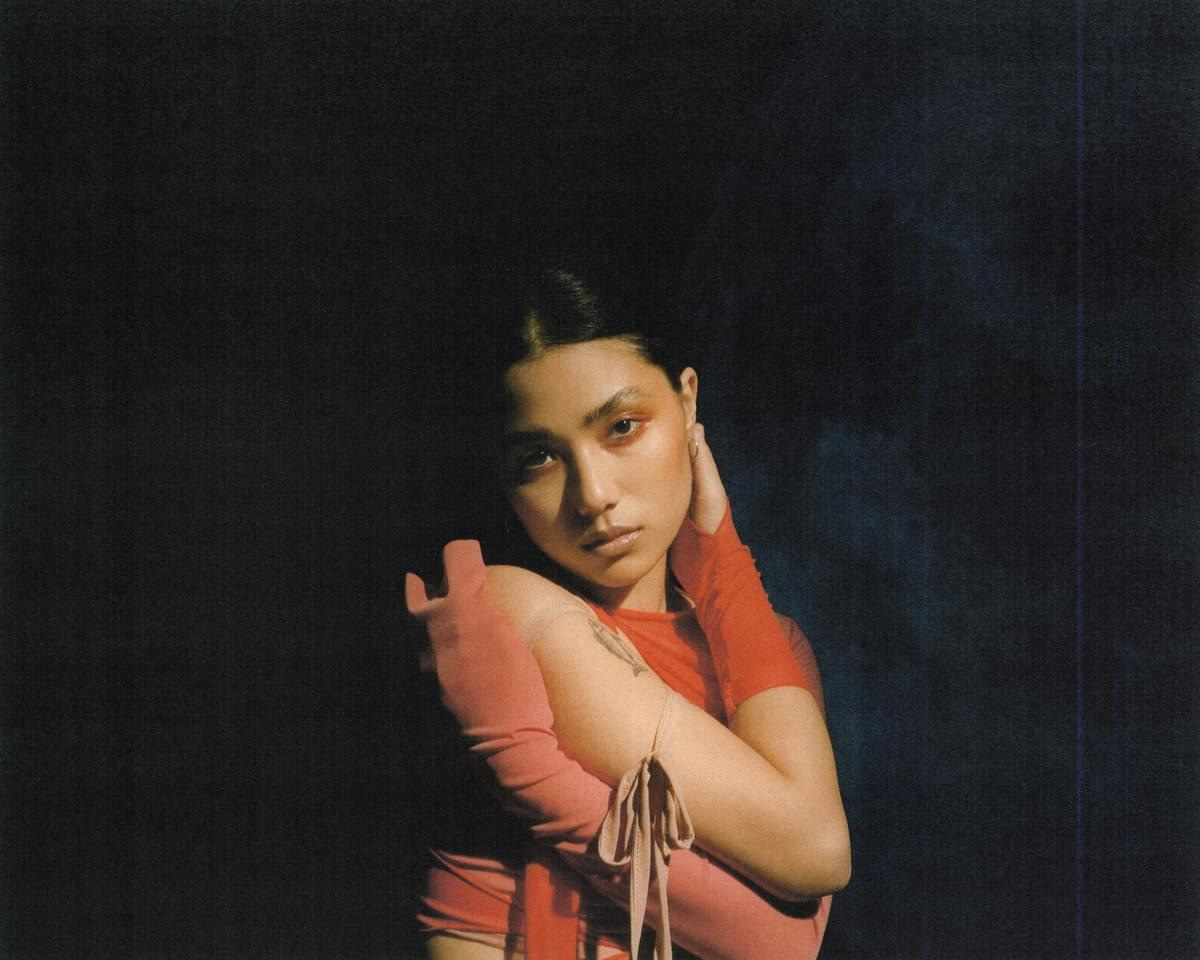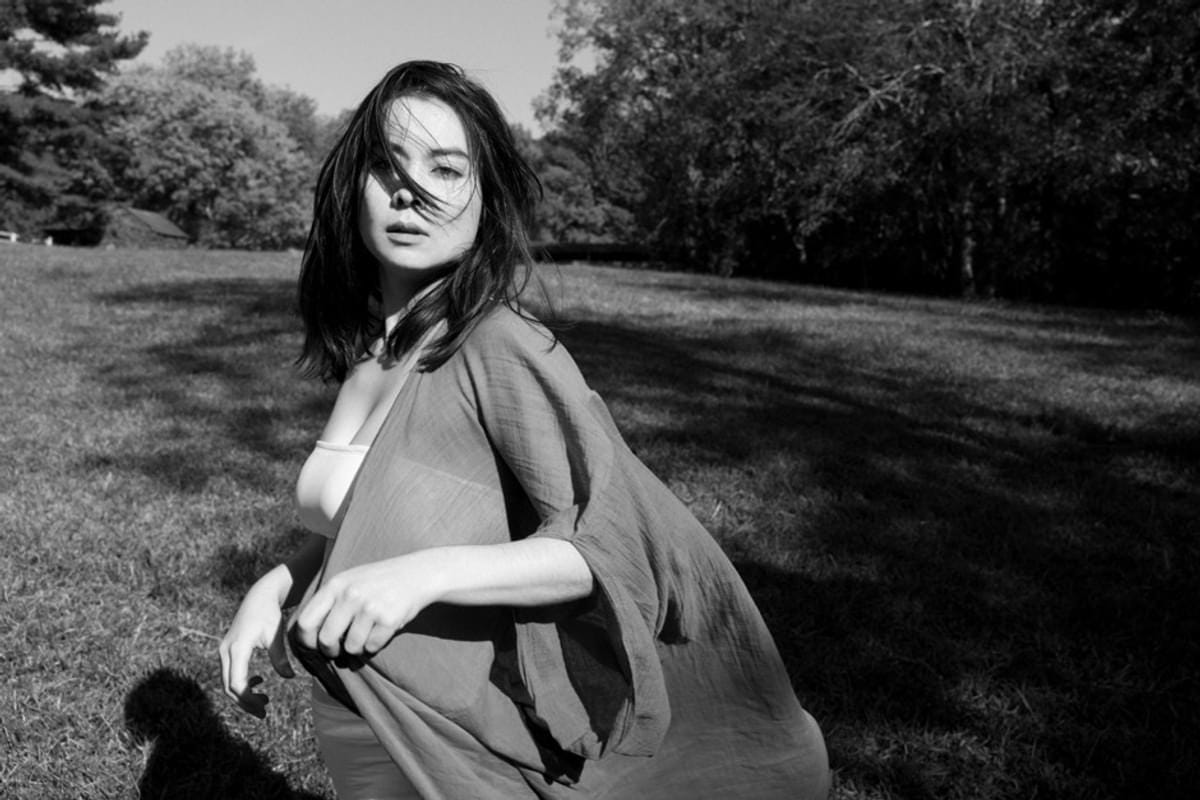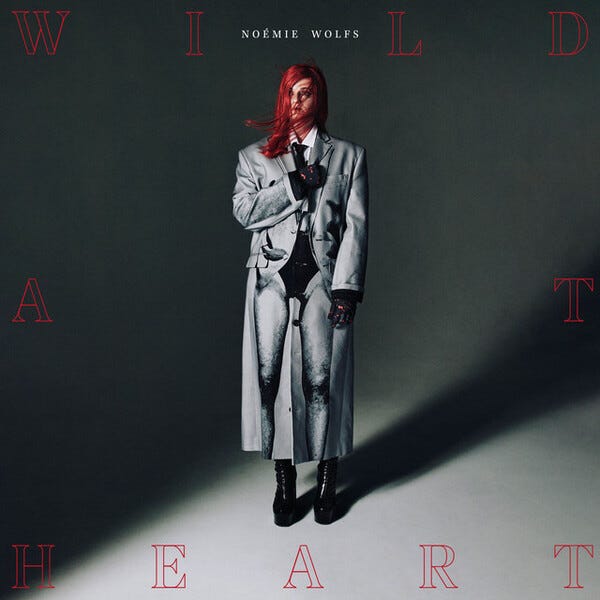Laufey: Acts of Manifestation
For Laufey, there is no better translation of the heart than an orchestra. The flutter of clarinets expresses that first flush of feeling; the thrill of violins captures the way it swoons, tickled by a touch or a particular look in the eyes; the nadir of trombones and trumpets understand how something so full can so easily sink.
It’s something universally felt, defying borders – and it’s a language in which the 24-year-old Icelandic Chinese, composer, multi-instrumentalist and storyteller is fluent. As the GRAMMY-nominated author of the biggest debut for a jazz album in Spotify history, Laufey has charmed twentysomethings in the millions with “that old black magic” imbued with uniquely modern matters of the heart.
Following the release of her 2022 debut record, Everything I Know About Love, Laufey has been determined to do justice to the magnitude of our emotions. Earlier this year, she released her live concert album, A Night at The Symphony, which was recorded during her two-night run at Harpa Concert Hall in her hometown of Reykjavík. In the wake of her second album proper Bewitched, that ambition has been elevated on a global scale, performing with world-class philharmonic orchestras from Washington DC to China. “Everything is amplified by the sheer volume of people playing and the emotion behind it,” she believes. “Nothing can replicate the sound and momentum of sixty classically-trained musicians playing at the same time.”
While being distracted by a love affair of her own, her introduction to dating was saved for the turn of her twenties. She might have been an acolyte of the old masters Ella Fitzgerald, Chet Baker and Billie Holiday, but when it comes to Laufey’s lyrics, she writes in a distinctly Swiftian spirit. “I like to say that my albums are like my journals,” she says. “My first album [Everything I Know About Love] was lighter, funnier. I was a hopeless romantic, and truthfully, I knew very little. It was very much asking questions into the abyss. The last song was literally called ‘Questions For The Universe’, and the last line was ‘Will I ever fall in love, or will I always search?’” Torn from those first growing pains, she has healed with hardened wisdom. “For my second album, I dove deeper into the emotions of love. It’s less questions, and more statements,” she shares.
Bewitched, then, is decidedly darker. The title carries the implications of illusion, lulled under a charm to a loss of control. “It’s about a type of love that doesn’t feel secure,” Laufey shares. “It feels almost like someone’s cast a spell on you, and it has completely engulfed you. In your younger twenties, that’s often how love can feel – something with no stable ground.” She awakens to an ugly truth on “Second Best” (“I love way too much, oh, this hurts to confess / Oh, you were my everything, I was your second best”), and sickens with the sobering reality that her feelings aren’t requited on “Haunted”.
I ask her if it’s often painful to confront these truths in her music, and she answers, “Strangely, I don’t think so. The healing that comes from putting these words to paper overrides any kind of fear I have of exposing myself to the world.” She tells me that during the era of life defined by her first record, her experiences with heartache felt alienating; she questioned if anyone felt these world-ending emotions as sharply as she had. Now, she has learned that yes, everybody does – and they survive it. “Rejection becomes easier,” she shares. “You train yourself to believe that as one door closes, another one opens. Even if you have a day or two where you think that’s not the case, you will always recover.”
Bewitched is out now via AWAL. Read the full story over on Best Fit.
Spill Tab battles imposter syndrome
In the four years between the debut Spill Tab single and now, Claire Chicha finally feels like she has her feet firmly planted in the ground. “So much has happened since then,” the 26-year-old Chicha explains, referencing her 2019 single “Decompose.” “There have been a lot of ups and downs. When I started, it [music] wasn’t my main thing. I was working other jobs, so when I did transition to music full-time time it was a weird transition. Not having another job to rely on meant that I put a lot of pressure on myself to make music. The last four years have been me trying to get comfortable with myself and this career and what I want it to look like.”
For a girl who quite literally grew up with music all around her, it made sense for Chicha to fall victim to the allure of music — sometimes to her own detriment. “I deal with a lot of impostor syndrome,” she states. “I saw a TikTok of a graduation speech and the person said we think of impostor syndrome as an individual fixing that problem, but it’s bigger than that. I think a lot of impostor syndrome comes from being in careers where white men are dominating and you feel impostor syndrome in those spaces because that place wasn't meant for you to exist in, you know?”
Klepto, her most recent EP, charts the amount of change she has navigated during the beginning phases of her career. It was, in her words, a period of “endless self-doubt” and anxiety that she was doing things incorrectly. “‘Fetišh,” the obvious standout on the EP, is larger-than-life and unapologetic, acting almost like a character that Chicha has both made up and longs to be. “I don't really have that many sexy songs, but this one I embrace aspects of being sexy. It's really fun to inhabit a different person for those like two and a half minutes. It’s fun to have different personas. It's just a great way to escape.”
She writes on this project not to ‘fix’ her impostor syndrome but to view it as something that can push her up rather than press her down. “I feel like I'll always experience it [impostor syndrome] because music is so big and I can’t ever imagine creating a song that good or an album that is groundbreaking. But I feel like I have been pushing myself more to just think about it in terms of creating something that I feel is my best work.”
Emeli Sandé embraces her pop desires
A decade ago, Emeli Sandé was momentarily bigger than The Beatles, breaking an albums chart record the band had held for almost 50 years. That might not seem like much of a feat in the streaming-skewed charts post-2015, where Taylor Swift regularly shatters records previously set by Taylor Swift, but back then it was kind of a big deal.
Sandé’s debut album Our Version of Events made her the UK’s biggest-selling artist in 2012 and second only to One Direction in 2013, scoring armfuls of awards along the way. She famously performed at both the opening and closing ceremonies of the London Olympics – not even Paul McCartney managed that – and, later, at the White House for then-president Obama. Then, as inevitable as the surviving Beatles using AI to resurrect one ‘last’ demo, the flipside of Sandé’s ubiquity eventually caught up with her. Big time.
For the Scottish artist, the backlash felt bewilderingly unfair. Growing up as an overly shy kid in rural Aberdeenshire, singing had given her a way to communicate and open up to the world. For the world to then turn around and seem to say ‘that’s quite enough, Emeli, thank you,’ came as a painful jolt to her confidence. More painful still was splitting from the man she’d loved since she was 17, their decade-long relationship demolished by Sandé’s exploding fame. “I definitely experienced the full Saturn return,” she says, thinking back on the maelstrom. “I had to dismantle so much of my life and what I thought life should be, and then had to try and piece it all back together again.”
Now on the cusp of releasing her fifth album, How Were We to Know, Sandé says she’s become “a completely different person” through learning to trust her own instincts. “I have so much more of a realistic view on life these days,” she explains. “Things didn’t work out in the perfect way I saw them working out, and although it was devastating at the time, I’m happy I went through that. And, looking back, I realised that maybe there were lies that I told myself and there were signs that maybe certain paths I took weren't the right paths to go down. I think trusting your instincts is so important. That’s a big lesson I’ve learned.”
Sandé’s rise to fame has been well documented, from the early features on hit songs by Chipmunk and Wiley to the co-writes for Rihanna, Katy Perry and Alicia Keys, and the decision to stop using her real name, Adele. But at this stage in her career, where she came from feels less relevant than where she’s still to go. When her 10-year stint at Virgin EMI came to an end in 2020 and she found herself without a label, management or publisher as the UK headed into lockdown, Sandé used the freedom and the enforced stillness of the pandemic to her advantage.
“So often in life you’re just chasing your own tail in one way or another, so it was quite a luxury to have that time and space to write,” she says, reflecting on how, by examining her own deep connection with music, she worked out what she really wanted to say with it. “That, combined with being on an independent label that let me do whatever I wanted, creatively, has allowed me to make something that I feel is exactly what I wanted to make.”
Three things to get excited about this week
The musical: Earlier this week, Mitski announced she will helm the music and lyrics for the forthcoming stage production of Walter Tevis’ The Queen’s Gambit. "Before [producers] Level Forward even brought the idea of making a musical of The Queen’s Gambit, I was a fan of the Netflix show, and an even greater fan of the original novel. So I was already determined to be a member of this team. And then I met Eboni and Whitney, and my determination grew tenfold! I absolutely had to be a part of this! I am ecstatic to get to work with all of these amazing creatives, who’ve each built beautiful and unique repertoires of their own," Mitski says.
The soundtrack: In another major producing announcement, Jack Antonoff has been tapped to lead the soundtrack for The New Look, the Apple TV+ historical drama focused on the life and work of Christian Dior and Coco Chanel. For the project, he’ll be joined by Lana Del Rey, Nick Cave, and Perfume Genius.
The radio: The holidays are upon us, and I’ve been doing some research on what to get the audiophiles in my life. One gadget that stood out among the rest was the Sangean WR-11SE, a retro-looking radio perfect for desks or coffee tables. The device connects to AM/FM signals and comes with an aux cable connect. For your analogue-inclined friends and family, this might be the perfect gift!
Something Old, Something New
Every week, one of our writers or editors share their recommendations of two records they love - one from the past, one from the present. This week, Quentin Harrison on Sam Phillips’s Omnipop (It’s Only a Flesh Wound Lambchop) (1988) and Wild at Heart by Noémie Wolfs (2023).
Sam Phillips has been my favorite music discovery of 2023.
I came across the singer-songwriter’s eighth studio effort Omnipop (It’s Only a Flesh Wound Lamchop) earlier this summer. From its dramatic title on over to its retro-modernist cover art (courtesy of Len Peltier and Salvatore Totino), I was curious. Ms. Phillips did not disappoint whatsoever.
Sonically, Omnipop is an intoxicating alternative-genre cocktail with pronounced notes of exotica (“Slapstick Heart”) and rock-funk fusion (“Plastic Is Forever”). Although produced by the acclaimed T-Bone Burnett (Phillips’ then husband), it was the lady herself that supercharged these pop pieces with her textured vocal instrument and wry way with a lyric. And yet, the record was critically dismissed upon its release!
For Phillips, it was a strangely disappointing result for what was meant to be the culmination of her secular career on Virgin Records. She’d initially come to notice in Christian rock circles via the Myrrh label in 1983, but that space couldn’t contain her creativity. Omnipop would be her final release for Virgin before she trekked toward greener pastures, first with Nonesuch Records and then her own independent diskery via Littlebox Recordings where her musical adventures continue. Despite critics misreading Omnipop, it has maintained its fetchingly eclectic disposition, and served as my formal gateway into Phillips’ prolific and thrilling canon.
Belgian pop act Hooverphonic had me hooked from first listen. I love all three women who have fronted their groovy soundscapes at times, but there’s just something about Noémie Wolfs! What followed her tenure with the group—spanning four albums from 2010 to 2015—was an equally spellbinding solo career with Hunt You (2016) and Lonely Boy’s Paradise (2020). Each effort had her build on already impressive indie-pop chops. Wolfs’ most recent offering, Wild at Heart, further cements her abilities as a writer, singer and producer. She’s joined by her partner Simon Casier (of Balthazar renown) in a support tune-smithing role.
A dreamy, immersive experience primarily rooted in a blend of orchestral and synth-pop aesthetics, Wolfs spins tales of complicated romance on “A Little Bit” (one of the record’s two singles) and “Bad Luck.” The project has remained in rotation for me since I got my hands on it and that’s how synchronal Wild at Heart is—everything is perfectly paced, sequenced and arranged without coming across as overtly choreographed or sterile. In short, it’s the type of music that excites me and I want to share it with others.
Wild at Heart is definitely one of the finer releases put forward this year.
Listen to the week in new music by following our Discovery playlist
Dropping at midnight every Thursday, follow our 20-track playlist for a taste of the best new music from the most exciting breaking artists.
These are the songs our editors and writers have on repeat right now, taken from the hundreds of tracks released in the last seven days. Leading the selection this week are new tracks from Penelope Scott, Kaeto, Friko, DAISY WORLD, Born At Midnite, and coverstar Sarah Meth.









